Immerse into a space of social change through our book recommendations. Navigate diverse points of view from social change practitioners, academics, and transformative storytellers. Browse books sorted by stories of social change, academic books on social change and general social change books.
Know that SCI shares book recommendations, but does not benefit from any economic revenue.
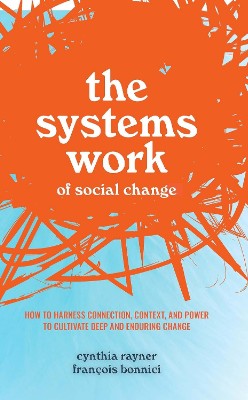
The issues of poverty, inequality, racial injustice and climate change have never been more pressing or paralyzing. Current approaches to social change, which rely on linear thinking and traditional power dynamics to 'solve' social problems, are not helping. In fact, they may only be entrenching the status quo. Systemic social challenges produce bewildering results when we try to solve them due to their complexity, scale, and depth. While strategies to tackle complexity and scale have received significant attention and investment, challenges that arise from deeply-held beliefs, values, and assumptions that no longer serve us well have been largely overlooked. This book draws on stories of committed social changemakers to uncover a set of principles and practices for social change that dramatically depart from the industrial approach. Rather than delivering solutions or being lured by grander visions of 'systems change', these principles and practices focus on the process of change itself. Simple yet profound, these stories distil a timely set of lessons for leaders, scholars, and policymakers on how connection, context, and power sit at the heart of the change process, ensuring broader agency for people and communities while building social systems that are responsive in a rapidly-changing world.
Order Now
York Times bestselling author Dan Heath explores howto prevent problems before they happen, drawing on insights from hundreds of interviews with unconventional problem solvers. So often in life, we get stuck in a cycle of response. We put out fires. We deal with emergencies.We stay downstream, handling one problem after another, but we never make our way upstream to fix the systems that caused the problems. Cops chase robbers,doctors treat patients with chronic illnesses, and call-center reps address customer complaints. But many crimes, chronic illnesses, and customer complaints are preventable. So why do our efforts skew so heavily toward reaction rather than prevention? Upstream probes the psychological forces that push us downstream—including “problem blindness,”which can leave us oblivious to serious problems in our midst. And Heath introduces us to the thinkers who have overcome these obstacles and scored massive victories by switching to an upstream mindset. Upstream delivers practical solutions for preventing problems rather than reacting to them. How many problems in our lives and in society are we tolerating simply because we’ve forgotten that we can fix them?
Order Now
In development circles, there is now widespread consensus that social entrepreneurs represent a far better mechanism to respond to needs than we have ever had before--a decentralized and emergent force that remains our best hope for solutions that can keep pace with our problems and create a more peaceful world. David Bornstein's previous book on social entrepreneurship, How to Change the World, was hailed by Nicholas Kristof in the New York Times as "a bible in the field" and published in more than twenty countries. Now, Bornstein shifts the focus from the profiles of successful social innovators in that book--and teams with Susan Davis, a founding board member of the Grameen Foundation--to offer the first general overview of social entrepreneurship. In a Q & A format allowing readers to go directly to the information they need, the authors map out social entrepreneurship in its broadest terms as well as in its particulars.
Order Now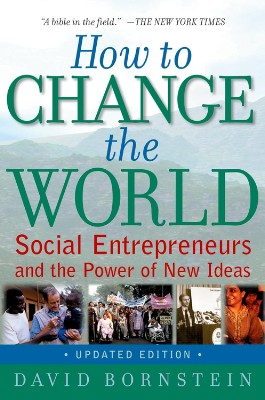
Published in over twenty countries, How to Change the World has become the Bible for social entrepreneurship. It profiles men and women from around the world who have found innovative solutions to a wide variety of social and economic problems. Whether they work to deliver solar energy to Brazilian villagers, or improve access to college in the United States, social entrepreneurs offer pioneering solutions that change lives.
Order Now
Why has Warby Parker been able to make such dramatic inroads against the behemoths in the long established eyeglass market? How has Method revolutionized the soap aisle? Amid the cacophony of online retailers, why has Etsy seen such explosive growth, with 2013 annual sales north of $1 billion? These companies all have been disruptive because they are operating from a strong social/environmental purpose. They are proving a counterintuitive truth – purpose can drive profits. But it’s not just innovative startups that are getting in on the action. Blue chip companies such as Nike, Coca-Cola and IBM are innovating within their organization to create a positive social and environmental impact globally. This is not a trend. It’s the future of business.
Order Now
What makes great nonprofits great? In the original book, authors Crutchfield and McLeod Grant employed a rigorous research methodology derived from for-profit books like Built to Last. They studied 12 nonprofits that have achieved extraordinary levels of impact―from Habitat for Humanity to the Heritage Foundation―and distilled six counterintuitive practices that these organizations use to change the world. This book has lessons for all readers interested in creating significant social change, including nonprofit managers, donors, and volunteers.
Order Now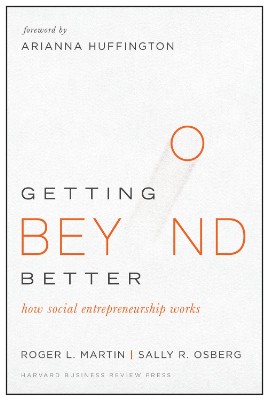
In this compelling book, strategy guru Roger L. Martin and Skoll Foundation President and CEO Sally R. Osberg describe how social entrepreneurs target systems that exist in a stable but unjust equilibrium and transform them into entirely new, superior, and sustainable equilibria. All of these leaders--call them disrupters, visionaries, or changemakers--develop, build, and scale their solutions in ways that bring about the truly revolutionary change that makes the world a fairer and better place. Getting Beyond Better sets forth a bold new framework, demonstrating how and why meaningful change actually happens in the world and providing concrete lessons and a practical model for businesses, policymakers, civil society organizations, and individuals who seek to transform our world for good.
Order Now
B Corps are a global movement of more than 3,300 companies in 70 countries--like Patagonia, Ben & Jerry's, Kickstarter, Danone North America, and Eileen Fisher--that are using the power of business as a force for good. B Corps have been certified to have met rigorous standards of social and environmental performance, accountability, and transparency. This book--winner of an Independent Book Publisher's Association IPPY Award as one of the best business books of 2020--is the authoritative guide to the what, why, and how of B Corp certification.
Order Now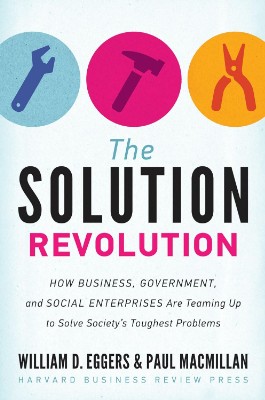
World hunger. Climate change. Crumbling infrastructure. It’s clear that in today’s era of fiscal constraints and political gridlock, we can no longer turn to government alone to tackle these and other towering social problems. What’s required is a new, more collaborative and productive economic system. The Solution Revolution brings hope—revealing just such a burgeoning new economy where players from across the spectrum of business, government, philanthropy, and social enterprise converge to solve big problems and create public value.
Order Now
Businesses have a big role to play in a capitalist society. They can tip the scales toward the benefit of the few, with toxic side effects for all, or they can guide us toward better, more equitable long-term solutions. Christopher Marquis tells the story of the rise of a new corporate form—the B Corporation. Founded by a group of friends who met at Stanford, these companies undergo a rigorous certification process, overseen by the B Lab, and commit to putting social benefits, the rights of workers, community impact, and environmental stewardship on equal footing with financial shareholders. Informed by over a decade of research and animated by interviews with the movement’s founders and leading figures, Marquis’s book explores the rapid growth of companies choosing to certify as B Corps, both in the United States and internationally, and explains why the future of B Corporations is vital for us all.
Order Now
Renowned playwright George Bernard Shaw once said "The reasonable man adapts himself to the world, the unreasonable one persists in trying to adapt the world to himself. Therefore all progress depends on the unreasonable man." By this definition, some of today's entrepreneurs are decidedly unreasonable--and have even been dubbed crazy. Yet as John Elkington and Pamela Hartigan argue in The Power of Unreasonable People, our very future may hinge on their work. Start investing in, partnering with, and learning from these world-shaping change agents, and you position yourself to not only survive but also thrive in the new business landscape they're helping to define.
Order Now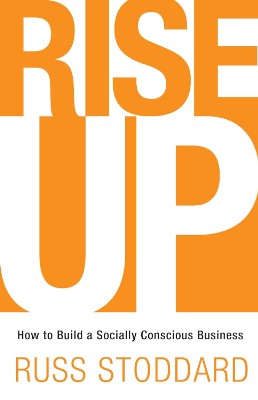
A new breed of socially conscious companies is changing how consumers shop, where employees work, and the way in which the world does business. Rise Up: How to Build a Socially Conscious Business sets the stage for this optimistic business trend where companies create financial profit for stakeholders through products, services, and business models that create social impact and public benefit. With more than 25 years of experience running a Certified B Corporation (earned by meeting rigorous standards of social and environmental performance, accountability, and transparency) that has always had social responsibility at its core, Russ Stoddard offers insights and guidance on how to create a socially conscious business, as well as encouraging words for social entrepreneurs of every generation.
Order Now
Some of the biggest problems facing the world—war, hunger, poverty, and environmental degradation—are essentially system failures. They cannot be solved by fixing one piece in isolation from the others, because even seemingly minor details have enormous power to undermine the best efforts of too-narrow thinking. While readers will learn the conceptual tools and methods of systems thinking, the heart of the book is grander than methodology. Donella Meadows was known as much for nurturing positive outcomes as she was for delving into the science behind global dilemmas. She reminds readers to pay attention to what is important, not just what is quantifiable, to stay humble, and to stay a learner.
Order Now
Jackson's new book responds to the growing interest in systems ideas and their application, and builds on the success of his previous work with Bob Flood Creative Problem Solving. This book is different from existing texts in the systems field - it provides a clear introduction to the origins of systems thinking, concepts and the development of applied systems thinking and offers an account of 'critical systems practice' which demonstrates how other systems methodologies, model and methods can be used in combination. Creative Problem Solving is comprehensive in scope, offering a brief introduction to all main 'holistic approaches to management' and demonstrating, with case studies, how each is used in practice. This straightforward and clear text from an established author in the field will be welcomed by students and academics as the 'new' Creative Problem Solving - a comprehensive, practical guide to a potentially difficult subject
Order Now
You can get happier. And getting there will be the adventure of your lifetime.
INSTANT #1 NEW YORK TIMES BESTSELLER
In Build the Life You Want, Arthur C. Brooks and Oprah Winfrey invite you to begin a journey toward greater happiness no matter how challenging your circumstances. Drawing on cutting-edge science and their years of helping people translate ideas into action, they show you how to improve your life right now instead of waiting for the outside world to change.
With insight, compassion, and hope, Brooks and Winfrey reveal how the tools of emotional self-management can change your life―immediately. They recommend practical, research-based practices to build the four pillars of happiness: family, friendship, work, and faith. And along the way, they share hard-earned wisdom from their own lives and careers as well as the witness of regular people whose lives are joyful despite setbacks and hardship.
Equipped with the tools of emotional self-management and ready to build your four pillars, you can take control of your present and future rather than hoping and waiting for your circumstances to improve. Build the Life You Want is your blueprint for a better life.
Order Now

Scaling the Social Enterprise is an ideal text for courses that focus on social entrepreneurship and social innovation, at either the graduate or undergraduate level. Common themes across high growth social startups discussed in the book include:
Featuring high profile, high growth social startups including Fair Trade USA, Revolution Foods, Sanergy, Kiva, d.light, Back to the Roots, and Grameen America, the chapter on funding social startups also profiles social funders such as Bridges Fund Management and Better Ventures, amongst others.
Order Now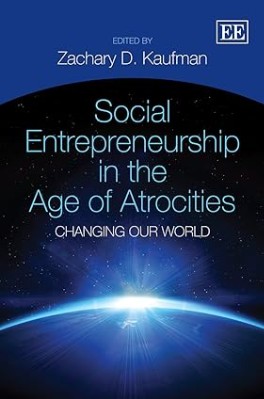
The authors in this book address the clear need for further examination of social entrepreneurship. They discuss the challenges, obstacles, and opportunities of the field and lend new insight to the concept, history, and methodologies of social entrepreneurship. The book profiles case studies based on some of the most innovative and effective social enterprises addressing atrocities, including the National Vision for Sierra Leone, Asylum Access, the Kigali Public Library, Indego Africa, Generation Rwanda, Orphans Against AIDS, Americans for Informed Democracy, and Children of Abraham. Social Entrepreneurship in the Age of Atrocities will inform, instruct, and build the community of social entrepreneurs.
This unique, essential collection of first-hand accounts is an inspiring and informative addition to the evolving social entrepreneurship literature. It will be of particular interest to social entrepreneurs; students, scholars, and practitioners of business, management, public policy, social policy, and development studies; anyone with a philanthropic mindset; and all those who are invested in creating and maintaining a socially responsible, accountable world.

For more than a century, women have fought for equality. Yet, time and again, their battles have fallen short. Even so-called constitutionally-protected equal rights can be withdrawn by judges and undermined by legislators. But the greater problem is in the notion of equality itself.
In Breaking Free, culture writer Marcie Bianco persuasively argues that the very concept of equality is a fallacy, an illusory goal that cannot address historic forms of discrimination and oppression. Starting with the campaign for women’s suffrage and traveling through modern history, she shows us how equality has been designed to keep women and disenfranchised communities chasing an unobtainable goal. Conditioned for generations to want equality, it has become an insidious mindset locking us into the gender binary and reductive identity politics. Bianco calls upon a long-overlooked lineage to argue that only freedom can liberate feminism from these constraints, and proposes three freedom practices for women to reclaim their bodily autonomy and power.
What happens if we free ourselves of equality? Controversial and thrilling, Breaking Free guides readers toward new hope for the future of the feminist movement.

As environmental problems grow larger and more pressing, conservationists have had to adapt. With a shrinking window of time to act, they are turning to broad approaches to combat continental- and global-scale crises of biodiversity loss, invasive species, and climate change. Pathways to Success—the long-awaited successor to the classic volume Measures of Success—is a modern guide to building large-scale transformative programs capable of tackling the complex conservation crises we face today.
In this strikingly illustrated volume, coauthors Nick Salafsky and Richard Margoluis walk readers through fundamental concepts of effective program-level design, helping them to think strategically about project coordination, funding, and stakeholder input. Chapters in the first part of the book look at all aspects of designing and implementing large-scale conservation programs while the second part focuses on how to use data and information to manage, adapt, and learn from program strategies. In addition, the authors offer practical advice for avoiding pitfalls, such as formulaic recipes and simplistic silver-bullet solutions that can trip up otherwise well-intentioned efforts. Abundant graphics help to explain and clarify concepts presented in the text, and a glossary in the back matter defines technical terms for the reader.
Pathways to Success is the definitive guide for conservation program managers and funders who want to increase the scale and effectiveness of their work combating biodiversity loss, climate change, and other pressing environmental issues.

In an age when business leaders solemnly profess dedication to principles of environmental and social justice, Christopher Marquis’s provocative investigation into the real costs of doing business reveals the way that leaders of the corporate world gaslight to evade responsibilities by privatizing profits and socializing costs. “Who pays?” for the resulting climate and environmental damage, racism, low wages, and cheap goods: the average citizen and the taxpayer.
By bringing to light ideas that today are on the fringe but rapidly making their way into the mainstream, Marquis outlines a new regenerative paradigm for business in society. He tells of a group of pioneers trying to not just reform but transform the way business is conducted all over the world. By taking novel actions to reimagine business operations in responsible ways, minimize their negative impacts, and create new ways for business to properly absorb their hidden costs, these leaders provide blueprints to move the needle on vexing social and environmental issues.
What’s in it for leaders of the corporate world? The model of reform presented provides clear guidance on how to get ahead of the curve as an emerging economic order is formed. No business can lead from the front if it is morally-backward looking. History has shown time and again that those who get out in front of emerging changes in our social and environmental landscape protect themselves from inevitable eclipse.
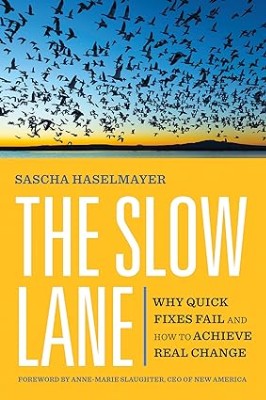
Society celebrates leaders who promise fast, easy solutions to the world’s problems—but quick fixes are just mirages that fade, leaving us with the same broken systems. The truth is, effective social change happens through slow, intentional actions. The author, a globally acclaimed social entrepreneur, offers a 5-step process for taking the slow lane to change—the lane that gets you to the right place faster:
Using dozens of examples—prison reform in England, urban development in Venezuela, healthcare in the Navajo Nation, early childhood education in New York, and many more—The Slow Lane shows how, by following the principles taught in this book, readers can create lasting change.

The reform of China’s social welfare system, the development of civil society, and the prosperity of corporate social responsibility have nourished the seeds of social enterprises in China, while the introduction of international social enterprise concepts has inspired social enterprises to take root. There are no legal forms specifically designed for social enterprise. Therefore, social enterprises have to adopt a legal status with one of the existing legal forms, such as enterprises, civil nonenterprise units, and specialized farmers’ cooperatives, and they are regulated and protected by the laws and regulations related to them. Also, the identity of social enterprises is given through the B Corp certification system or the indigenous certification system. Although the Chinese government is still cautious about formulating specific social enterprise laws and policies at the national level, there have been breakthroughs in local governments’ supportive attitudes and actions toward social enterprises. From a macroperspective, the state’s emphasis on the participation of market forces in public services and the introduction of China’s innovative policies in areas such as rural revitalization, elderly care, and so on have a positive impact on the practice of social entrepreneurship.
Order Now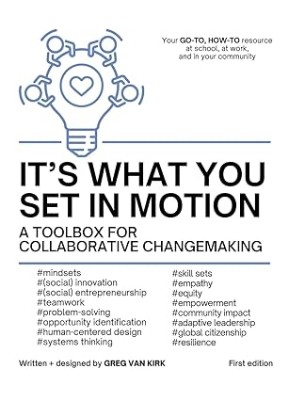
It’s What You Set in Motion: A Toolbox for Collaborative Changemaking is a how-to resource for aspiring and practicing changemakers everywhere. Use this hands-on, one-of-a-kind, all-in-one toolbox to build and enhance essential twenty-first century skill sets: empathy, adaptive leadership, collaborative problem-solving, teamwork, community engagement, innovation design, entrepreneurship, global competence, critical thinking, and others.
Whether you support the private, social, governmental, or education sector, this toolbox serves your needs. It includes strategic design principles, tool kits, changemaking innovation mini-case videos, foundational how-to’s, and a means to get advice from and learn from others.
This toolbox was designed over twenty years by Greg Van Kirk, a former banker, Returned Peace Corps Volunteer, award-winning social entrepreneur, strategic consultant, facilitator, and educator.
Order Now
We live in a world where health disparities continue to persist, disproportionately affecting marginalized communities and perpetuating cycles of poverty, illness, and inequality. The time has come for us to harness the power of data to create a more equitable healthcare landscape for all, but this promise is like Dr. Martin Luther King Jr. metaphor of a “blank check” whose promise can come “back marked insufficient funds” if we do not ensure NOW that AI does not further already existing inequalities.
Data holds the key to unlocking insights into the complex drivers of health inequity. By collecting, analyzing, and understanding data, we can identify the social determinants of health, such as income, education, and access to healthcare services, that contribute to disparities in health outcomes. By identifying these factors, we can design targeted interventions that address the root causes of health inequity. Moreover, data can be used to monitor the progress of these interventions, ensuring that resources are allocated effectively and that our efforts are yielding the desired results. Data-driven evaluations enable us to learn from our successes and failures, refine our strategies, and continue pushing the boundaries of what is possible in the fight against health inequity.
However, the potential of data can only be realized if the “great vaults of opportunity” to AI are democratized for all. This is about a lot more than just eliminating bias. This book is an introduction to the enormous potential and pitfalls of AI for anyone who cares about improving health for all. It is a conversation that is just beginning. I hope you can be a part of it.
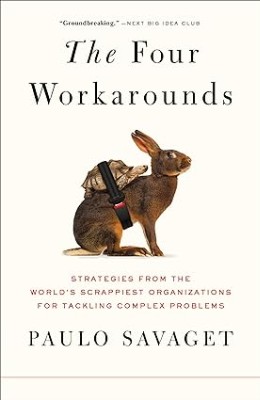
This book helps us live happier, successful, and more fulfilling lives." —Jenn Lim, CEO and cofounder of Delivering Happiness, and bestselling author of Beyond Happiness
We constantly encounter complex problems at home, in our places of work, and in society at large. Even if we had all the time and money in the world, sometimes no good solution can be found. So, what should we do, especially when we can’t wait? The answer: a workaround.
For ages, global corporations have been lecturing small organizations and not-for-profits on how to get things done. As it turns out, it should have been the other way around. In this groundbreaking book, award-winning researcher Paulo Savaget shows how the most valuable lessons about problem-solving can be learned from the scrappiest groups.
Savaget draws most of his examples from small organizations dedicated to social action that have made an art form out of subverting the status quo and have proved themselves adept at achieving massive wins with minimal resources. Through his research, Savaget identified the four workarounds that these groups commonly employ: the piggyback, the loophole, the roundabout, and the next best. With vivid and fascinating examples from his life and travels, he demonstrates how each one works and how to know which one to use when.
The Four Workarounds shows how seemingly intractable problems—from public urination to the challenges of delivering lifesaving medicine to remote communities—were addressed using unconventional tactics. Some of the world’s biggest and most admired companies are already using Savaget’s research to transform the ways they do business. And these same lessons can also revolutionize the ways we approach the challenges we all encounter every day of our lives.

An “essential and engaging ” (Richard Florida) exploration of social decline in America: its true causes and the practical steps each of us can take to combat it, starting with the places we call home.
The neighborhoods we live in impact our lives in so many ways: they determine who we know, what resources and opportunities we have access to, the quality of schools our kids go to, our sense of security and belonging, and even how long we live.
Yet too many of us live in neighborhoods plagued by rising crime, school violence, family disintegration, addiction, alienation, and despair. Even the wealthiest neighborhoods are not immune; while poverty exacerbates these challenges, they exist in zip codes rich and poor, rural and urban, and everything in between.
In Fragile Neighborhoods, fragile states expert Seth D. Kaplan offers a bold new vision for addressing social decline in America, one zip code at a time. By revitalizing our local institutions—and the social ties that knit them together—we can all turn our neighborhoods into places where people and families can thrive.
Readers will meet the innovative individuals and organizations pioneering new approaches to everything from youth mentoring to affordable housing: people like Dreama, a former lawyer whose organization works with local leaders and educators in rural Appalachia to equip young people with the social support they need to succeed in school; and Chris, whose Detroit-based non-profit turns vacant school buildings into community resource hubs.
Along the way, Kaplan offers a set of practical lessons to inspire similar work, reminding us that when change is hyperlocal, everyone has the opportunity to contribute.

The global education crisis is a complex problem that requires change from teachers, school managers, civil society, implementers, planners, governments and donors. Addressing the issues that lie beneath this crisis requires new ways of working. Systems thinking is a suite of approaches to grappling with complex problems that is beginning to gain traction in international education. This book brings together new research in the nascent field of systems thinking in international education.
Outlining the implications that systems thinking can hold for future research, practice and progress towards Sustainable Development Goal 4, a diverse range of leading scholars, policymakers and practitioners present novel research to encourage the shift from a linear view of change to a systems view. Chapters present diverse approaches to applying systems thinking in education across middle- and low-income countries, alongside research on how this has changed mindsets more widely. Questioning notions such as scaling and the universal applicability of ‘what works’, authors here suggest that locally relevant evidence and systemic rewards for using it are necessary to achieve SDG 4. This innovative book exemplifies how systems thinking offers the tools, frameworks and concepts to improve outcomes in education systems.
With the education crisis further exacerbated by the COVID-19 pandemic, this timely book is essential reading for all those concerned with education and sustainable development goals. This thought-provoking book should be read by all those working to achieve SDG4; those whose day jobs inspire them and who look to their bookshelves for new ideas.

The book brings together perspectives on entrepreneurship research, education and practice to understand social entrepreneurship in its wider societal, political and economic context. Its unique contribution comes from its interdisciplinary approach that spans from the societal to the organizational level, with specific focus social innovation and management. It views management of social entrepreneurship and social enterprise in light of its societal context and employs social innovation to critically assess social entrepreneurship as driver of change. The emergence of social entrepreneurship as an academic field is linked to several societal trends such as public austerity, financial crises, new social challenges and a growing counter-movement to globalised capitalism. Generally seen as organisations serving both social and economic objectives, social enterprises, social innovation and social entrepreneurship have their roots in civil society, civic activism or the solidarityeconomy, but also manifest themselves as for-profit companies, with new organisational forms emerging and old ones changing. The contributions in this book elucidate these developments and the role of social entrepreneurs and social enterprises. Furthermore, the book offers great insight into the specific ways of managing, leading and creating innovation in social enterprises as well as perspectives on how to understand their social impact or value creation.
Order Now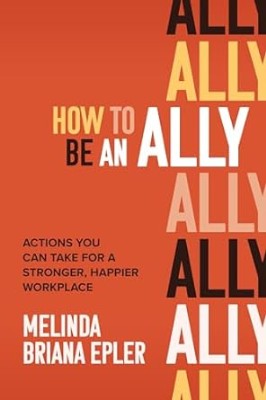
Through the power of allyship, each of us can create an equitable, innovative workplace where everyone feels safe, valued, and able to thrive
How can you help someone else thrive? How can you interrupt the biases, microaggressions, and inequities that prevent people around you from excelling? How can you build an innovative workplace fueled by equity, diversity and belonging?
Every business leader today should be asking themselves these questions. Systems and processes have been skewed too long in favor of some at the expense of others, and things are changing―fast. How to Be an Ally shows how to take personal responsibility for driving change that’s good for people―and for business. You’ll learn the ins and outs of allyship and build the knowledge and skills you need to:
Uniquely insightful and extremely timely, How to Be an Ally humanizes diversity and inclusion and facilitates greater empathy and understanding between people of all identities. It teaches us that every individual can learn about the imbalance in opportunity and work to correct it.
The key to true diversity, equity, and inclusion is allyship. This one-of-a-kind guide provides everything you need to use allyship to create a better workplace for ourselves and our colleagues.

Social Change Now is a practical guide for those at every stage of their individual and organizational journeys towards justice, equity and solidarity. It introduces an ecosystems framework that includes ten roles that many of us play in service of our social change values. But the book goes further. It contains detailed descriptions and real-world examples, reflection prompts (with room to write responses), and accessible tips that can immediately be put into action. This book is a resource that will accompany individuals and organizations not only in times of crisis, but throughout their lifelong social change journeys to build connected communities and equitable systems in our world. Over the past three years, people and organizations around the world have used the social change ecosystem framework to respond to the pandemic, express solidarity during the uprisings against anti-Black racism, and support multiracial coalitions struggling for reproductive rights, immigrant and refugee protections, and climate justice.
Order Now
Our planet has never been smaller. Technological advancements have compressed time and space, making the world more immediate and interconnected. This Little World clearly sets out how social innovation practices can enable organizations and communities to create a more sustainable, just, and equitable future for our shared lives on Earth.
Today, cloud‑based communication systems span the globe, connecting people and markets in the blink of an eye. Remote workers interact daily on high‑impact, virtual teams. Telehealth professionals provide medical care to the residents of secluded mountain villages. But a shrinking planet is not without its challenges: climate change, food shortages, pollution, and war are persistent headwinds. We need strategies and tools that promote stability and growth, and we need technology that is more inclusive, trusted, and focused on community goals. This Little World seeks to inspire those who aim to explore the rich and rewarding world of social innovation. It is a practical guide to innovation opportunities that will enrich an organization’s capacity for transformation and impact. The book explores how social impact employees can create projects that are purpose‑driven, scalable, and successful. With insights from leading social innovators, the book demonstrates how "tech for good" organizations are using social innovation strategies, emerging tools, and sustainable practices to support environmental causes, humanitarian initiatives, accessibility, healthcare, cultural heritage, and more.
This Little World: A How‑To Guide for Social Innovators is for technologists, business leaders, managers, and employees in the social impact sector, as well as anyone with aspirations for purpose‑driven outcomes in their work. Corporate executives, entrepreneurs, and students alike can learn from this new model of innovation, where it is possible to do good and do well.
Order Now
Our planet has never been smaller. Technological advancements have compressed time and space, making the world more immediate and interconnected. This Little World clearly sets out how social innovation practices can enable organizations and communities to create a more sustainable, just, and equitable future for our shared lives on Earth.
Order Now
In this edited book, we provide foundational tenets of Gandhian perspective, and present examples of social organizations that are aiming to insulate themselves by adopting community and village-centered approaches to restructuring socially-embedded economic activities that align with Gandhian principles. These cases highlight the relevance of Gandhi's thoughts in the field of social entrepreneurship. We examine key principles such as Sarvodaya (the welfare of all), Antodaya (the upliftment of the weakest), self-sufficiency, self-reliance, Nai Talim (holistic education), and Trusteeship. We explore how social organizations implement these principles to promote resilience and well-being at the community level.
The COVID-19 pandemic revealed unsustainable practices in the world, including disrupted supply chains, contagious effects of integrated global economy that ignore the local self-reliance, and unsustainable internal displacement that make cities dependent on rural labor and rural population dependent on urban areas for jobs. These issues show that there are systemic problems with how our society and market are structured. The traditional way of development that focuses on profit maximization and unlimited wants has caused problems like inequality, resource depletion, and disproportionate wealth accumulation. Unlimited growth in a limited world has led us to social, economic, and ecological crises. However, degrowth, as an approach has been criticized for wanting to go back to pre-industrial times. In this context, Gandhi's ideas offer alternatives. Gandhi promotes moderation in how market activities are structured and how individual consumption practices are followed. This can help reduce the negative impact of economic activities on people and the planet, and move towards a more structured and inclusive economy.
Order Now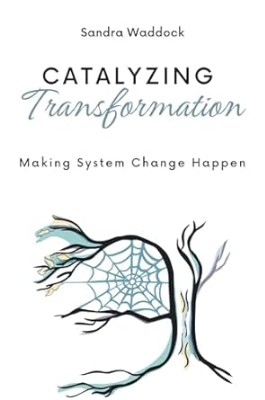
The world faces a multitude of crises that demand transformative changes in how we live and do business. Yet a core question is…how to make purposeful transformation happen? Catalyzing Transformation shows the way through:
Whether you catalyze social changer, responsible businesses, activists, policymakers, or students of change, Catalyzing Transformation can help!
Order Now
This collection of award-winning academic case studies showcases innovative approaches to sustainable business and social entrepreneurship. Each case utilizes interviews with company founders and executives, internal documents, and other original research to reveal details not available elsewhere, giving students a behind-the-scenes look at marketing, finance, and strategy. With examples from business, government, and nonprofit organizations, the cases are suitable for graduate and undergraduate courses in a range of topics. All cases were researched and written by Portland State University faculty, students, and staff.
Order Now
In the absence of a widely accepted and common definition of social enterprise (SE), a large research project, the "International Comparative Social Enterprise Models" (ICSEM) Project, was carried out over a five-year period; it involved more than 200 researchers from 55 countries and relied on bottom-up approaches to capture the SE phenomenon. This strategy made it possible to take into account and give legitimacy to locally embedded approaches, thus resulting in an analysis encompassing a wide diversity of social enterprises, while simultaneously allowing for the identification of major SE models to delineate the field on common grounds at the international level. These SE models reveal or confirm an overall trend towards new ways of sharing the responsibility for the common good in today’s economies and societies. We tend to consider as good news the fact that social enterprises actually stem from all parts of the economy. Indeed, societies are facing many complex challenges at all levels, from the local to the global level. The diversity and internal variety of SE models are a sign of a broadly shared willingness to develop appropriate—although sometimes embryonic—responses to these challenges, on the basis of innovative economic/business models driven by a social mission. In spite of their weaknesses, social enterprises may be seen as advocates for and vehicles of the general interest across the whole economy. Of course, the debate about privatisation, deregulation and globalised market competition—all factors that may hinder efforts in the search for the common good–has to be addressed as well. The first of a series of four ICSEM books, Social Enterprise in Asia will serve as a key reference and resource for teachers, researchers, students, experts, policy makers, journalists and other categories of people who want to acquire a broad understanding of the phenomena of social enterprise and social entrepreneurship as they emerge and develop across the world.
Order Now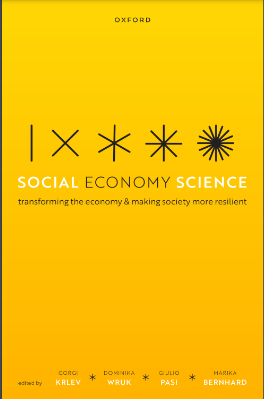
This book:

This book looks at the psychotherapeutic effects of Dance Movement Therapy (DMT) with a focus on the experiences of survivors of gender-based violence and their social development, psycho-social rehabilitation, and reintegration within society.
The author, a sociologist and dancer, uses a model she calls Sampoornata— or Fulfilment, to merge sociology and dance in order to help survivors of sexual violence overcome their trauma. Sampoornata was developed to help survivors of gender-based violence and trafficking, by focusing on their specific needs, and helping them to express themselves and overcome emotional and psychological pain. Through interviews with and detailed narratives of survivors, the book takes the readers through the development of the model, its implementation, practice, and impact on their lives. Situated within the social, cultural, as well as geographical context of India, the book is an important resource for rethinking the creative approaches, theories, and practice of DMT worldwide.
This book will be of interest to researchers and students of psychology, psychotherapy, dance and movement studies, and to those who work with dance and movement therapy. It will also be useful for professionals working in the areas of gender violence, trafficking, trauma, psycho-social rehabilitation, and well-being.
Order Now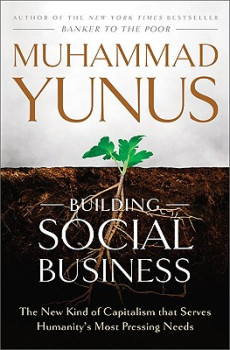
The Nobel Peace Prize winner and bestselling author shows how entrepreneurial spirit and business smarts can be harnessed to create sustainable businesses that can solve the world's biggest problems. Muhammad Yunus, the practical visionary who pioneered microcredit and, with his Grameen Bank, won the 2006 Nobel Peace Prize, has developed a new dimension for capitalism which he calls "social business." The social business model has been adopted by corporations, entrepreneurs, and social activists across the globe. Its goal is to create self-supporting, viable commercial enterprises that generate economic growth as they produce goods and services to fulfill human needs. In Building Social Business, Yunus shows how social business can be put into practice and explains why it holds the potential to redeem the failed promise of free-market enterprise.
Order Now
How to Change the World provides vivid profiles of social entrepreneurs. The book is an In Search of Excellence for social initiatives, intertwining personal stories, anecdotes, and analysis. Readers will discover how one person can make an astonishing difference in the world. The case studies in the book include Jody Williams, who won the Nobel Peace Prize for the international campaign against landmines she ran by e-mail from her Vermont home; Roberto Baggio, a 31-year old Brazilian who has established eighty computer schools in the slums of Brazil; and Diana Propper, who has used investment banking techniques to make American corporations responsive to environmental dangers.
Order Now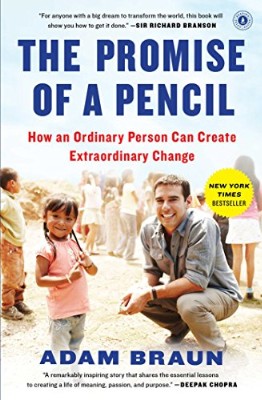
The riveting New York Times bestseller about a young man who built more than 250 schools around the world—and the steps anyone can take to lead a successful and significant life. Adam Braun began working summers at hedge funds when he was just sixteen years old, sprinting down the path to a successful Wall Street career. But while traveling he met a young boy begging on the streets of India, who after being asked what he wanted most in the world, simply answered, “A pencil.” This small request led to a staggering series of events that took Braun backpacking through dozens of countries before eventually leaving a prestigious job to found Pencils of Promise, the organization he started with just $25 that has since built more than 250 schools around the world.
Order Now
In this newly revised 10th anniversary edition, Yvon Chouinard--legendary climber, businessman, environmentalist, and founder of Patagonia, Inc.--shares the persistence and courage that have gone into being head of one of the most respected and environmentally responsible companies on earth. "This is the story of an attempt to do more than change a single corporation--it is an attempt to challenge the culture of consumption that is at the heart of the global ecological crisis." --From the Foreword by Naomi Klein, bestselling author of This Changes Everything
Order Now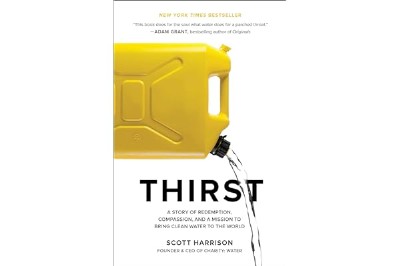
NEW YORK TIMES BESTSELLER • An inspiring personal story of redemption, second chances, and the transformative power within us all, from the founder and CEO of the nonprofit charity: water. At 28 years old, Scott Harrison had it all. A top nightclub promoter in New York City, his life was an endless cycle of drugs, booze, models—repeat. But 10 years in, desperately unhappy and morally bankrupt, he asked himself, "What would the exact opposite of my life look like?" Walking away from everything, Harrison spent the next 16 months on a hospital ship in West Africa and discovered his true calling. In 2006, with no money and less than no experience, Harrison founded charity: water. Today, his organization has raised over $400 million to bring clean drinking water to more than 10 million people around the globe.
Order Now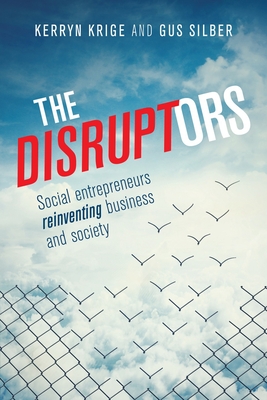
Can business change the world? Can the world change business? For a new breed of social entrepreneurs, striving to build and grow enterprises that fight social ills, foster opportunity, and help to improve society, the answer is not can, it’s must. Impassioned by purpose, driven by dreams, emboldened by ideals, social entrepreneurs imagine a better way to a better world. And then they go out of their way to bring it to life. In the process, they shake the dust off old ways of thinking and disrupt the way business has always been done. In this book, brought to you by GIBS, a leading business school based in Johannesburg, South Africa, you’ll get to meet The Disruptors. Through these tales of daring, struggle, triumph and innovation, you’ll see the world through the eyes of a diverse range of social entrepreneurs, and learn their secrets for changing the world by changing business. From healthcare to mobile gaming, from education to recycling, from dancing to gardening, these are the game-changers, the difference-makers, the doers of good. Here are their stories.
Order Now
KaBOOM! is the powerful, uplifting journey of a man who grew up in a group home with his seven brothers and sisters and went on to build a world-class nonprofit that harnesses the power of community to improve the lives of children. In 1995, Darell Hammond read an article in the Washington Post about an unthinkable tragedy: Two young children suffocated in a car on a hot summer day in southeast Washington, DC. The story indicated that the children had nowhere to play; in the absence of a playground, they had climbed into an abandoned car. Reading the article fueled Hammond's sense of injustice, and his life's mission came into focus. Hammond founded KaBOOM!, a national nonprofit that provides communities with tools, resources, and guidance to build and renovate playgrounds and playspaces.
Order Now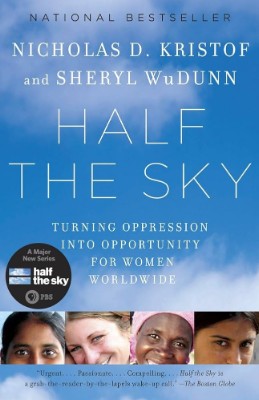
From two of our most fiercely moral voices, a passionate call to arms against our era’s most pervasive human rights violation: the oppression of women and girls in the developing world. With Pulitzer Prize winners Nicholas D. Kristof and Sheryl WuDunn as our guides, we undertake an odyssey through Africa and Asia to meet the extraordinary women struggling there, among them a Cambodian teenager sold into sex slavery and an Ethiopian woman who suffered devastating injuries in childbirth. Drawing on the breadth of their combined reporting experience, Kristof and WuDunn depict our world with anger, sadness, clarity, and, ultimately, hope. Deeply felt, pragmatic, and inspirational, Half the Sky is essential reading for every global citizen.
Order Now
Tom Szaky dropped out of Princeton a decade ago to found TerraCycle, a company that makes the nonrecyclable recyclable. TerraCycle is now at the forefront of the eco-capitalist movement, partnering with more than 35 million people in twenty countries in the collection of waste and transforming that waste into useful products. Creating trash cans from chip bags and plastic benches from cigarette butts, TerraCycle has redefined recycling. Revolution in a Bottle is a rollicking tale of entrepreneurial adventure and an essential guide to creating a company that’s good for people, good for profits, and good for the planet. Since Revolution in a Bottle was first published in 2009, TerraCycle has grown dramatically from a small company offering worm poop in a soda bottle to a pioneer of recycling worldwide. This completely revised and expanded edition continues the story of this incredible company.
Order Now
Social enterprises provide an innovative approach and are effective as poverty reduction agents that can contribute to the promotion of cohesive communities. This publication reviews the results of a two-year social enterprise study in Europe and the CIS. The present publication contains the results of a two-year research project comprised of several phases. These included a preliminary study to map the situation of social enterprises in 12 countries. After a multi-stakeholder seminar, three national reports were produced by three different research teams. While the four pieces have been integrated and share a similar structure, each reflects a different scholarly approach, socio-cultural standpoint, and style.
Order Now
With proven strategies of agitating, innovating, and orchestrating change, Power, for All shows how those with less power can challenge established structures to make them more balanced. The authors teach you how to power-map your workplace to find who can create real change at work, plan for and cause sustaining shifts, and understand the two basic needs all human beings share—safety and self-esteem—and the resources people seek to satisfy those needs: money and status, but also autonomy, achievement, affiliation, and mortality. They explore how these dynamics play out through vivid storytelling: as Donatella Versace successfully leads her brother’s company after his death—despite having a title, but little influence; what social movements can learn from youth climate activists and how they can go farther; and how a manager can gain the trust of skeptical employees and improve the workplace.
Order Now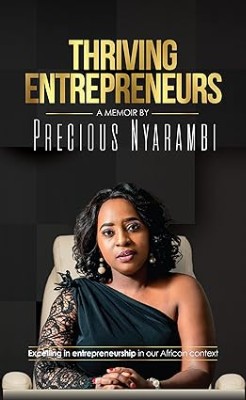
Arriving on the unforgiving streets of Johannesburg as an innocent and impressionable young Zimbabwean woman, Precious Nyarambi has nothing to fall back on but her own strength, determination and drive to succeed.
Thrown into entrepreneurship, not as a choice but out of necessity, she overcomes personal hardship and takes on the challenges and frustrations of business as if she was born to it!
Not satisfied with just her own success however, she embraces the tenets of social entrepreneurship and works tirelessly to uplift others; from this altruistic and selfless philosophy, Vessels of Virtue is created. This organisation has a divine mandate to give individuals, families, communities and nations a profound voice which transcends the mountains of influence and resonates across borders, shatters through boundaries and collapses the constraints of marginalisation.
For all those striking out as pioneers on the rocky road to self-employment, this book will be an invaluable companion, a source of inspiration and an authentic and honest reference guide. For even though entrepreneurship is a beautiful experience and a noble calling, the uphill struggle is very real, but then so too is the magnificent view from the top!
